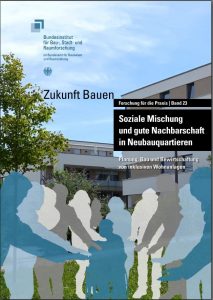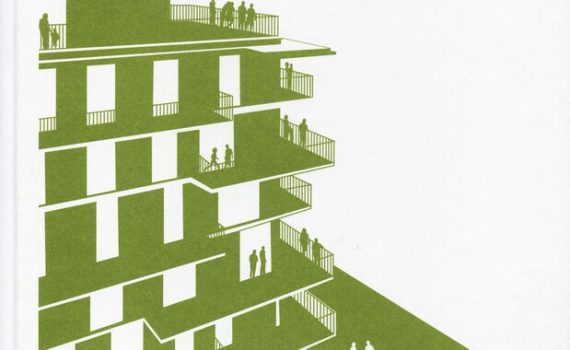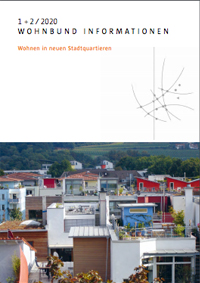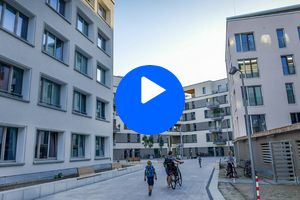 Isabella Marboe (ed.) Bauen für die Gemeinschaft in Wien Neue gemeinschaftliche Formen des Zusammenlebens Edition Detail 2021, 144 pages, de/eng, Euro 39,90
The housing projects presented in Vienna arose from the desire to develop living concepts that strengthen the sense of community and contribute to a society based on solidarity - building groups and participatory projects, neighbourhood houses, temporary or permanent social forms of living and working for marginalised groups such as the homeless and people entitled to asylum. Private flats can be downsized if there is more shared space. These housing and living models are alternatives to capitalist investor thinking. The users get involved, also in the project planning. Ulrike Schartner and Alexander Hagner from gaupenraup+/- explain the starting point and strategies of their work in an introductory interview. In two essays, Robert Temel and Isabella Marboe show the development of communal forms of building and living.
Isabella Marboe (ed.) Bauen für die Gemeinschaft in Wien Neue gemeinschaftliche Formen des Zusammenlebens Edition Detail 2021, 144 pages, de/eng, Euro 39,90
The housing projects presented in Vienna arose from the desire to develop living concepts that strengthen the sense of community and contribute to a society based on solidarity - building groups and participatory projects, neighbourhood houses, temporary or permanent social forms of living and working for marginalised groups such as the homeless and people entitled to asylum. Private flats can be downsized if there is more shared space. These housing and living models are alternatives to capitalist investor thinking. The users get involved, also in the project planning. Ulrike Schartner and Alexander Hagner from gaupenraup+/- explain the starting point and strategies of their work in an introductory interview. In two essays, Robert Temel and Isabella Marboe show the development of communal forms of building and living.
Kategorie für Blog: Cohousing
 The Institute for Urban Planning and Social Research WEEBER+PARTNER (Stuttgart) examined 16 case studies and interviewed responsible persons in municipal, cooperative and private housing companies. The projects are characterized by a wide range of planning and construction approaches. According to the study, social diversity requires structural diversity: Rental, social and owner-occupied apartments of different sizes and with diverse layouts were created in the new housing quarters. They are socially mixed - even within buildings - with the respective proportions in the neighbourhood being derived from local requirements. The new quarters also offer space for communal forms of living, for example for older people and those in need of care. And they are characterised by an attractively designed and green residential environment. Concept awards promote the planning and implementation of such projects: Through them, plots of land are not allocated according to the highest price, but for the best concept.
The Institute for Urban Planning and Social Research WEEBER+PARTNER (Stuttgart) examined 16 case studies and interviewed responsible persons in municipal, cooperative and private housing companies. The projects are characterized by a wide range of planning and construction approaches. According to the study, social diversity requires structural diversity: Rental, social and owner-occupied apartments of different sizes and with diverse layouts were created in the new housing quarters. They are socially mixed - even within buildings - with the respective proportions in the neighbourhood being derived from local requirements. The new quarters also offer space for communal forms of living, for example for older people and those in need of care. And they are characterised by an attractively designed and green residential environment. Concept awards promote the planning and implementation of such projects: Through them, plots of land are not allocated according to the highest price, but for the best concept.
The popular ESA dormitory on the campus of the TU Kaiserslautern (TUK) is in great need of renovation. The foundation's renovation concept for TUK envisions the former experimental building becoming a CO2-neutral building. The estimated costs for the work have not yet been fully raised. Therefore, the ESA residents are participating with a crowdfunding campaign, which has been available on the Startnext platform since September 13.
Germany's largest cooperative housing project in Berlin 28:58 min Video available until: 12/02/2020 First broadcast on: 2.12.2019 Living in the metropolis, in a large community, according to its own rules. Central, energy-saving, ecological, cosmopolitan, inclusive. The residents of Möckernkiez in Berlin-Kreuzberg have fulfilled this dream.
![]() bring-together is a digital matching platform for collaborative housing projects and people looking for a community. The platform allows you a dynamic matching instead of a classic advertisement. In this way, needs are brought together. This makes it easier for you to find like-minded people and your own individual family of choice for communal living. The platform is for people who want to revolutionize community living and housing. "We believe that communities are the only sustainable way of living because sustainable, connected and responsible living is only possible in community."
bring-together is a digital matching platform for collaborative housing projects and people looking for a community. The platform allows you a dynamic matching instead of a classic advertisement. In this way, needs are brought together. This makes it easier for you to find like-minded people and your own individual family of choice for communal living. The platform is for people who want to revolutionize community living and housing. "We believe that communities are the only sustainable way of living because sustainable, connected and responsible living is only possible in community."
The ecovillage Sieben Linden has existed near Berlin for 30 years. The documentary gives a detailed insight into life there and what the villagers have experienced so far. Available until 28.10.2024
Demand Paper of the Alliance of Young Cooperatives Berlin of March 9, 2018 In order to advance the construction of affordable housing, an Alliance of Young Cooperatives was founded in Berlin in 2017. "Housing cooperatives have been a cornerstone of the socially responsible and affordable housing market in Berlin for well over 100 years," notes the cooperative board of Bremer Höhe and [...]
For the fifth time and in keeping with its 120th birthday, Spar- und Bauverein Solingen eG awarded the nationwide Klaus Novy Prize for innovations in cooperative building and living in July. This prize was established by SBV eG as a stimulus for cooperative ideas on the occasion of its 100th anniversary. This year, the prize was awarded to [...]
BaunetzWoche#494: Cooperatives are currently experiencing a true renaissance in Zurich. The "Mehr als Wohnen" neighbourhood and the "Zwicky Süd" project are now trying to bring urban qualities to the agglomeration. Can these two projects facilitate new lifestyles beyond private housing? Link: www.baunetz.de/...baunetzwoche_ausgabe_5108639.html
TU Dortmund University conducted an excursion to Paris from 27 to 31 March 2017 as part of the research project "Co-Housing Initiatives in Europe". There, the researchers met French colleagues Anne Labit (Orléans University), Sabrina Bresson (ENSA Paris Val-de-Seine) and Claire Carriou (Paris Nanterre University)."
More and more people are answering the question "How do we want to live?" with "Together instead of lonely." Living in community has become very popular in recent years, among young and older people alike. The forms of the new housing, house and settlement communities are diverse: from self-sufficient eco-villages to multi-generational housing projects [...]
Cooperatives and building communities promise affordable and sociable living. But what is everyday life like there? Read more on the website of the Süddeutsche Zeitung
with sociologist Patrick Sachweh "It feels like everything is becoming more and more unequal - but people still don't want more redistribution. Sociologist Patrick Sachweh knows why." in the Süddeutsche Zeitung from 10.9.2016
Freiburg: the Berndt Koberstein Prize for Living Together and Solidarity in Freiburg, endowed with 10,000€, was awarded for the fifth time in Freiburg's "Weinschlösschen". The Mietshäusersyndikat, which began in the early 80s as a small cooperative on the Grether site, has grown into an association of 111 house projects with more than 2,000 residents in [...]
Hrsg. Wohnbund e.V. Creating sufficient affordable housing - especially in European conurbations - is one of the great challenges of our future and calls for new solutions. In view of demographic change, changing family structures and growing environmental awareness, completely new forms of housing have developed in Europe: shared living for young and [...]







